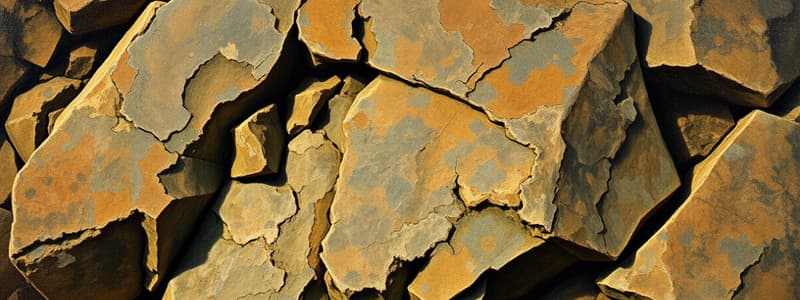Podcast
Questions and Answers
Metamorphic rocks are classified on the basis of?
Metamorphic rocks are classified on the basis of?
- Location and size
- Age and origin
- Color and weight
- Composition and texture (correct)
What is foliation in metamorphic rocks?
What is foliation in metamorphic rocks?
Any planar fabric element
What is lineation?
What is lineation?
Any linear fabric element
Define schistosity.
Define schistosity.
What does gneissose mean?
What does gneissose mean?
Describe slate.
Describe slate.
What characterizes phyllite?
What characterizes phyllite?
Can phyllite be foliated and linear?
Can phyllite be foliated and linear?
What is gneiss?
What is gneiss?
Define granofels.
Define granofels.
What is hornfels?
What is hornfels?
What is marble predominantly composed of?
What is marble predominantly composed of?
What is quartzite?
What is quartzite?
What characterizes amphibolite?
What characterizes amphibolite?
What is eclogite composed of?
What is eclogite composed of?
Define blueschist.
Define blueschist.
What is serpentinite?
What is serpentinite?
What is porphyroblastic?
What is porphyroblastic?
What does the prefix 'ortho-' indicate?
What does the prefix 'ortho-' indicate?
What does the prefix 'para-' indicate?
What does the prefix 'para-' indicate?
Flashcards are hidden until you start studying
Study Notes
Classification of Metamorphic Rocks
- Metamorphic rocks are categorized based on composition and texture.
Key Terms and Definitions
- Foliation: A planar fabric element in metamorphic rocks.
- Lineation: A linear fabric element observed in the structure of metamorphic rocks.
- Schistosity: Characterized by aligned minerals visible to the naked eye, indicating coarse grain.
- Gneissosity: Exhibits poorly-developed schistosity or is layered due to metamorphic processes.
Types of Metamorphic Rocks
- Slate: A compact, very fine-grained rock with prominent cleavage, possessing dull freshly cleaved surfaces.
- Phyllite: Contains schistosity with fine phyllosilicates that provide a silky sheen, although the minerals are not typically visible to the naked eye.
- Gneiss: A metamorphic rock with a distinctive gneissose structure, marked by bands of different minerals.
- Granofels: Lacks preferred orientation, resulting in a more homogeneous appearance.
- Hornfels: A type of granofels, typically fine-grained and compact, usually found in contact aureoles from thermal metamorphism.
- Marble: Composed primarily of calcite or dolomite, often formed from limestone or dolostone protoliths.
- Quartzite: Dominantly made up of quartz, usually derived from sandstone protoliths.
- Amphibolite: A metamorphic rock rich in hornblende and plagioclase minerals.
- Eclogite: Notable for its green and red coloration, containing clinopyroxene and garnet, typically originating from basalt.
- Blueschist: Characterized by blue amphibole; formed from metamorphosed mafic igneous rock or mafic graywacke.
- Serpentinite: An ultramafic rock altered at low grades, largely comprising serpentine.
Special Characteristics
- Porphyroblastic: Describes rocks with one or more large metamorphic minerals called porphyroblasts that grow significantly larger than surrounding crystals.
Prefixes Indicating Parent Material
- Ortho-: Prefix used for rocks with an igneous parent origin.
- Para-: Prefix indicating a sedimentary parent material.
Studying That Suits You
Use AI to generate personalized quizzes and flashcards to suit your learning preferences.




